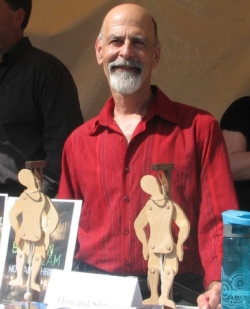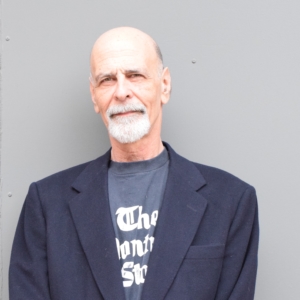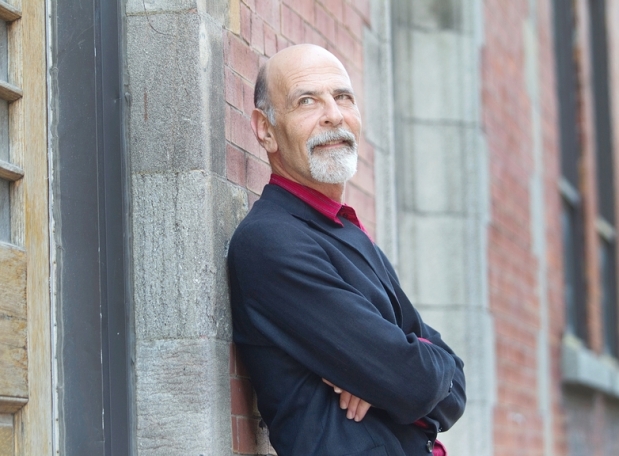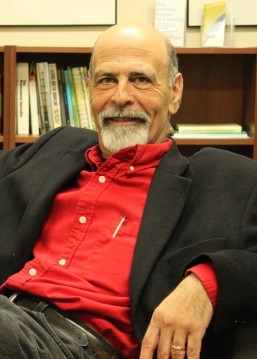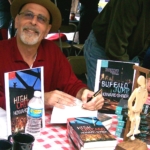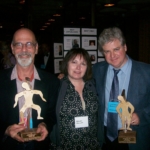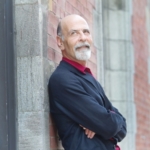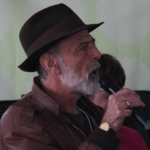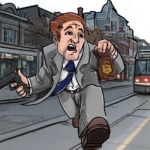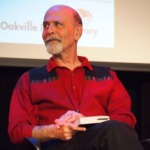To coincide with my appearance at the Blue Metropolis literary festival, the Montreal Gazette commissioned writer Harold Heft to do an interview and profile. He asked a lot of good questions, not all of which could make it into the final copy, so I am including both here: first the profile, then the full interview.
Howard Shrier’s detective heals the world one case at a time
Harold Heft, Special to The Gazette
Great detective novels operate on the assumption that any average citizen may have calamity waiting around the next corner. And when calamity strikes, that citizen will need to find a champion with the savvy, skill and strength to set the world right again.
Howard Shrier, a mystery writer who was born and raised in Montreal and currently lives in Toronto, knows plenty about surprises. “I started out as a crime reporter at the Montreal Star in 1979,” he says. “Every day is a complete mystery. You never know what will happen, good or bad, at any given time.”
It is this sense of mystery and fascination with the unexpected that inspired Shrier to leave a lucrative job in corporate communications to complete his first mystery novel, Buffalo Jump, published in 2008. The novel features the Jewish detective Jonah Geller, a martial arts expert hyper aware that his mother would have preferred him to have taken on a more traditional profession – like medicine or law. Though Geller is an atheist, he names his business World Repairs Detective Agency, a play on the Hebrew phrase tikkun olam, the moral imperative to heal the world.
Shrier credits legendary crime writers like Dashiell Hammett and Raymond Chandler with sparking his “lifelong love affair” with crime writing.
“There was something about these writers that combined grit, an eye for detail and narrative drive that more literary writers lacked,” he says. “There was a discipline to the storytelling I admired. Scenes propelled each other ever faster, the stakes rose, the heroes struggled against more powerful forces, but never gave up until justice was done. How could you beat that?”
Shrier followed Buffalo Jump with a second Jonah Geller novel, High Chicago, in 2009 – both novels were awarded prestigious Arthur Ellis Awards for Crime Writing. In Geller, Shrier has created an authentic new hero – a detective who approaches the dark side of human existence with a genuine self-effacing humour and with a clear understanding that he and his colleagues may be the last line of defence against chaos.
His new novel, Boston Cream, follows the pattern of taking Geller to a new city to solve a mystery that has left local police baffled; he is hired by the parents of a brilliant young transplant surgeon to find their missing son. The case takes Geller and his partners deep into the Boston crime scene to uncover an illegal organ trade.
Geller develops his skills on the job and learns hard lessons as his cases become darker and more complex.
“Jonah is somewhat naïve at the start of the series, less and less as it goes on,” Shrier says. “He is forced to do things he wishes he did not have to do. He realizes he is limited in what he can do to right wrongs, fight injustice. The bad guys are generally better prepared to fight than he is. Better armed. More ruthless. And I guess in a series there’s a need to go forward, raise the stakes in different ways, so you don’t feel like you are reading the same story in each book.”
Asked where he found inspiration to create Geller, Shrier draws parallels to his own life.
“I think every mystery writer creates a hero that is at least in part an idealized version of themselves,” he says. “Jonah is a lot like me in terms of outlook, sense of humour, moral outrage at greed and arrogance, but he is younger, taller, fitter, braver, tougher and a much better fighter. I gave up martial arts at 17; Jonah kept going. He would wade into a fight to protect someone. I might have many years ago, but today I’d be the guy calling 9-1-1.”
Shrier’s appearance at Blue Metropolis on April 20 will be a homecoming, and he notes that his next Jonah Geller novel, titled Miss Montreal (a nod to the legendary, 1970s-era restaurant on Décarie Boulevard), is set in his hometown. Much as his first three novels pull their drama from the day’s headlines, Miss Montreal, to be released in 2013, will, he says, focus on “reasonable accommodation of Muslims and Quebec politics a few months before an election.”
Shrier sacrificed much when he left his day job to bring Geller into existence: “As a cautionary tale to other writers,” he says, “I should point out that my salary in 2005 was $90,000. My earnings the following year were $9,000. I knew I wouldn’t make as much writing fiction as annual reports, but I wasn’t exactly prepared for a ruinous dive off a sheer financial cliff.”
Still, he has few regrets, and there are signs that his sacrifice will pay off. Boston Cream is the first of his novels to be distributed in the U.S., and his books are being developed for television by CTV. And, with earnest, Geller-like wit, Shrier concludes:
“My wife and kids still love me, so that’s all that matters.”
—————————————————————————————————
And now, the full interview:
Q: Do you see your appearance at Blue Met in Montreal as a homecoming?
A: Very much so. It will be my first major event in Montreal since publishing Buffalo Jump and I’m hoping old friends and family will turn up. These showcases and panels are always fun—you meet other writers, readers and fans—and it sounds like the Blue Met lineup will be great. While in Montreal, I’ll also be special guest at the local crime writers’ Arthur Ellis Award nomination event at Atwater Library April 19. Simultaneous events are held across the country as the shortlists for the 2012 awards are revealed.
Q: You left a 9-5 day job to pursue your dream of writing mystery novels. I think this is a version of a fantasy many people entertain. Can you share that story
A: I left a well-paying corporate communications job with full security and a great pension, to finish Buffalo Jump. I had Helen Heller as my agent by then, I was trying to finish the eighteenth rewrite, I was raising my boys, pulled in all directions and something had to give. She told me, ‘Don’t quit your day job,’ but did I listen?
The truth is, there was something missing in my corporate career–growth opportunities, mostly– and a deathly serious environment that sucked a lot of the fun out of writing–and I felt stuck. I was 48. I could hang in 12 more years, get a swell pension and then write full time for whatever years I had left. Maybe change jobs but a new learning curve would take me farther from finishing the book. My wife said she’d support whatever I did as long as I didn’t do it impulsively, which I didn’t. I negotiated a reasonably graceful exit from my employer in October 2005 and finished the final draft four months later.
As a cautionary tale to other writers, I should point out that my salary in 2005 was $90,000. My earnings the following year were $9,000. I knew I wouldn’t make as much writing fiction as annual reports, but I wasn’t exactly prepared for a ruinous dive off a sheer financial cliff. So success with a first time novel is something of a fantasy
How have things gone since then? One day this fall, I added up how much the move cost me in dollars: What I would have earned in six more years of high income, bonuses, pension payments and RRSP growth etc., versus what I earned from book payments, film options, teaching and consulting, and it came out close to $700,000. How’s that for fantasy?
Would I do it again? Yes. At least that particular job. If my employer had been more flexible, more modern it its approach, I might have been able to stay on, maybe work half time. But it was an old-school environment and time for me to go anyway.
And my wife and kids still love me so that’s all that matters.
Q: When you left the 9-5 life for the life of a novelist (with all the sacrifices of that decision), you obviously had a goal. Can you articulate that goal? Are you happy with your progress toward it?
A: My goal when I left the public service was simply to finish Buffalo Jump. I was close to the end, having gone through many revisions, but needed to focus on it to get it to the point where publishers would consider it. My job was intense and demanding and I felt like the servant of two masters, one of which had to win out. My agent warned me about leaving my day job, since first novels tend not to earn much, but I was determined to do it my way and left. Obviously, I’m happy with the way the book turned out, as it won a best first novel award and paved the way for more books. And it is still my favourite of the three Geller novels I’ve published.
As noted previously, the whole enterprise came at a great cost financially, but emotionally and artistically it has been worthwhile. I am not at my goal yet, which would be to live off the avails of my books. I am teaching and consulting to fill the gap. But I’m hoping each book brings me closer
Q: So what is it about Jonah that has inspired you to sacrifice so much for him?
A: Above all, he’s a mensch. I think every mystery writer creates a hero that is at least in part an idealized version of themselves. Jonah is a lot like me in terms of outlook, sense of humour, moral outrage at greed and arrogance, but he is younger, taller, fitter, braver, tougher and a much better fighter. I gave up martial arts at 17; Jonah kept going. He would wade into a fight to protect someone. I might have many years ago but today I’d be the guy calling 9-1-1.
Q: Jonah thinks often throughout the oeuvre about his inability to fit into a traditional professional role for a Jewish man of his age/generation. Is this a running joke or a serious pressure that he feels as a detective and you feel as a mystery writer?
A: I think this is both a joke and serious at the same time. If you were a Jewish man growing up where and when I did, there was definitely pressure to choose a traditional profession. And if you didn’t, why not? What was the matter with you? I didn’t have an older brother like Jonah’s (the highly successful lawyer), but there was a neighbour my age across the driveway who never left his desk and my mother would see me goofing off and look across the way and say, ‘Why can’t you be like him?’ It devolves into a joke of sorts about Jewish mothers, but there is serious pressure behind it. Plenty of guys I knew chose careers they didn’t necessarily want but had to satisfy their parents with a degree.
Q: Geller says he’s an atheist and yet seems to orient his life around the Jewish imperative of tikkun olam. I understand this seeming contradiction but still want to ask if you can explain it?
A: Jonah is like me, a profoundly Jewish atheist who takes from the culture (as opposed to the religion) the good things he believes in. He articulates it as tikkun olam because he is Jewish and that’s his framework, but were he gentile, he’d simply find another phrase for it. Like many of the private investigators who came before him, he is something of a knight errant, looking for wrongs to right.
Q: This is your third Jonah Geller novel. Do you have a sense of how the series will evolve moving forward?
A: Unfortunately, I’m not the kind of writer who plans a number of books ahead. my head is generally pretty full with the one I’m writing. I might have a general idea of location but that’s about it. I know there are writers out there who juggle more than one series and can tell you what is happening three books ahead in each one. I envy that ability but it isn’t me.
Q: Boston Cream seems darker than the previous two Geller novels. Uglier and sadder things happen. The limits of Geller’s powers show. Is there any reason why you took the series in a darker direction?
A: It is darker and sadder and that was intentional on my part. I’ve read many detective series where the hero goes from story to story without seeming to be affected by what happens before, either emotionally or physically. I don’t agree with that choice. It’s one of the reasons Boston Cream opens with Jonah still suffering the effects of a concussion he suffered in High Chicago. Because as we now know, concussions don’t just go away. All the detectives we see on TV who get knocked unconscious and minutes later are back in the fight…no. Would not happen. Similarly, I see Jonah carrying the emotional baggage from book to book. Bad things happen; he tries to make them better. But some things cannot be restored so simply. His best friend and partner, Jenn, is seriously affected by what happens in Boston Cream and that in turn has an effect on what happens in Miss Montreal.
Jonah is somewhat naive at the start of the series, less and less as it goes on. He is forced to do things he wishes he did not have to do. He realizes he is limited in what he can do to right wrongs, fight injustice. The bad guys are generally better prepared to fight than he is. Better armed. More ruthless. And I guess in a series there’s a need to go forward, raise the stakes in different ways, so you don’t feel like you are reading the same story in each book
Q: Each novel in the Geller series is named for and oriented around a different city. The unique landscape and culture and city to some extend shapes the story. I understand that your next novel is going to be set in Montreal. Can you describe how the character of the city provides a dramatic backdrop for the action?
A: I don’t want to give away too much, other than to say it is set in Montreal, where Jonah goes to investigate the murder of an old friend. He gets caught up in Quebec politics, tensions between Muslims and non-Muslims, and his own lack of French as he navigates another less familiar city and culture. The action takes place in the week leading up to the Fete Nationale, June 24, so there will be a lot of colour and fun in the streets. And maybe some student protests…
Q: Mysteries seem foreign to our day to day experience.
A: Sorry, but I couldn’t disagree more. Every day is a complete mystery. You never know what will happen, good or bad, at any given time. Not to mention the core mysteries of our lives (Does that girl love me? Should I follow this career? Have kids? Move to a new city? Believe in God? Believe the government?)
Q: Do you see the world in such a way that every shmoe has a potential mystery waiting for him around the next corner?
A: Very much so. Not to mention danger. I was in a horrific accident at age 17 involving an elevator at [my school], the details of which are best left aside. It wrecked my body to some extent but worse was what it did to my outlook. Today it would be called post-traumatic stress disorder but no one named it then, or did much about it. I’d be walking down the street and rear up if I saw something I thought was about to leap out at me and would usually be a fire hydrant. Ask my wife about the “wild dogs” that menaced us on our honeymoon early one morning in a misty alligator reserve–and turned out to be a pair of sign posts.
I see danger pretty much everywhere and that is part of what makes me good at this. The initial premise of Buffalo Jump–what if a hit man were hired to kill a five year old boy–arose from my own well of fears. My sons were three and six at the time.
Elmore Leonard told me in an interview 25 years ago that the core idea of most of his books was a good man in trouble. Someone who did not go looking for it but gets pushed into action. I’m intrigued by that concept and am thinking of exploring it in a standalone novel when Miss Montreal is done. An ordinary guy who gets swept up by dangerous events, as opposed to Jonah, who by nature and profession goes looking for trouble, and with more skill and courage than most.
Q: You seem skilled at pulling mysteries from the headlines of the day (cross-border prescription drug smuggling, black market organs, etc.) Do you find inspiration and menace everywhere?
A: I started out as a crime reporter at the Montreal Star in 1979 and remained something of a news junkie most of my life. In corporate life, I read four papers a day; today, with the Internet, I have access to the best of dozens of papers and magazines. And some ideas just seem to stick. I open a file and look for more. Bookmark and download like mad, copying everything into Word files in case the links disappear or expire.
Some ideas are driven by access–I know a few developers and real estate lawyers, so I chose tower building as the topic of High Chicago. I knew I’d have a lot of support and advice. Organ donation was something I first read about in connection with China, and suspicions that the number of organs available there exceeded the number of the primary source, executed criminals, and that Falun Gong members were being summarily killed as well. As that coalesced, I decided to use Boston because it’s a medical hub where the top transplant surgeons are found, and again because of access—flights are cheap and easy and my wife has close family there who could put me up and show me the parts of the city I needed to see.
The danger in being topical, as I found out with Buffalo Jump, is that the news changes around you. Canada’s laws regarding the sale of prescription drugs over the Internet, changed more often than the weather up to and after the completion of the manuscript. At a certain point you have to say (and I did in my notes), that for dramatic purposes, this is how things stand when the story takes place. Internet sales are now illegal. Period.
Because Miss Montreal focuses on “reasonable accommodation” of Muslims and Quebec politics a few months before an election, the current headlines are providing great fodder. The launching of the new Coalition pour l’avenir du Quebec, for example, the controversy over unlabelled halal meat, the protests outside convenience stores whose owner insults Quebecois, the things that get under people’s skin. . . those will be part of the Montreal landscape, They have to be. I’m also setting the story in the days leading up to the Fete Nationale June 24. But again, at a certain point, I’ll pull away from the headlines and onto my own path where things happen my way.
Q: Jonah seems very cinematic – any talk about a movie?
A: The books were optioned for television by Toronto-based Media Headquarters soon after Buffalo Jump came out. It is now in development at CTV with two ex-Montrealers creating the pilot script: Rene Balcer, who spent twenty years as show-runner of various Law & Order franchises, and created Criminal Intent; and Avrum Jacobson, creator of Endgame and a writer or producer of ReGenesis, Republic of Doyle and other Canadian series.
Q: Why were you drawn to detective fiction as opposed to any other genre or straight “literary” fiction?
A: Interesting question. I was a creative writing student in the late seventies, reading more experimental fiction, magical realism, Russian novelists, contemporary Jewish writers like Bellow, Malamud and Roth, all of which were good. And then one day I picked up a Ross Macdonald novel and for some reason, it completely hooked me. I rampaged through his books, then went back to Hammett and Chandler, and a lifelong love affair was kindled. There was something about these writers that combined grit, an eye for detail and narrative drive that more literary writers lacked. There was a discipline to the storytelling I admired. Scenes propelled each other ever faster, the stakes rose, the heroes struggled against more powerful forces but never gave up until justice was done. How could you beat that?
Q: Have you been able to make inroads into the US market?
A: Boston Cream is the first of my books to be distributed to the U.S. Before that it was online retailers only. I’ve heard it’s done well in Boston so far, but it’s too early to know whether inroads is the right word. It be more of an inpath, or a little tramping down of the grass. . . we’ll see.


